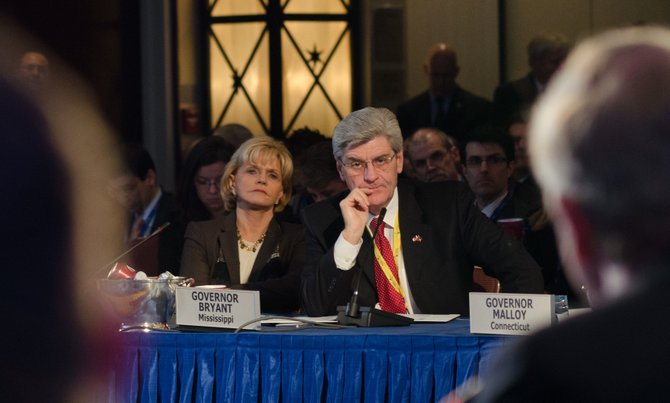Gov. Phil Bryant is still against Medicaid expansion, but says he's now willing to talk to hospitals about a deal on health-care funding. Photo by Courtesy Flickr/USDAgov
Gov. Phil Bryant is still against Medicaid expansion, but says he's now willing to talk to hospitals about a deal on health-care funding.
Specifically, Bryant, who met with hospital executives last week, wants to sit down with hospitals about other ways to cushion the blow from massive funding cuts when certain provisions of the Affordable Care Act go into effect.
Bryant's newfound religion to at least have a discussion with hospitals came as a bit of a surprise given his repeated rebukes of Obamacare, but might be the result of political blowback.
After Bryant said last week that he does not "see expansion of Medicaid in Mississippi as it exists today, with all its waste, fraud and abuse," legislative Democrats pounced, asking why Bryant hasn't righted a program under his purview.
In a statement issued jointly with the Mississippi Hospital Association, Bryant said he and hospitals "have come together in good faith to work out a possible solution to our funding issues."
Under the ACA, certain hospital-funding mechanisms would sunset and be replaced by other revenue streams, primarily state Medicaid expansion. However, Bryant refuses to even discuss such an expansion.
Chris Anderson, CEO of Singing River Health Systems in Gulfport, said the Medicaid expansion question is a "dead end" with Bryant, so hospitals will have to work with the governor's administration to find alternate funding sources.
"It has not been productive saying you're either for it or against it," Anderson said. "That's really not gotten us anywhere thus far in the session. So the interest now is saying, 'is there anything between these two positions that we can all agree on?'"
Among those alternate sources are excise taxes on medical equipment, reductions in payments to insurers for certain services, assessing annual fees to insurers and taxing high-end health plans, Anderson said.
No specific proposals were offered by the hospital association, which held a news conference Monday in Madison.
The hospital association's announcement came on the same day as a House hearing that showed little consensus on whether Medicaid expansion would represent a net loss or gain for Mississippi.
"Medicaid and the Affordable Care Act is likely the biggest issue this legislature or any other legislature has faced in decades," House Medicaid Committee Chairman Bobby Howell, R-Kilmichael, said at the start of a three-hour hearing.
Lucien Smith, deputy chief of staff and policy director for the governor, gave the first of six presentations. He argued before the packed hearing room that expansion would cost hundreds of millions. But Smith said that even those who support the expansion should wait before making up their minds.
"Making an error on Medicaid expansion will be incredibly costly. And secondly, it's premature to make a decision on it," Smith said.
Rep. Cecil Brown, D-Jackson, asked Smith about comments he had made on the Paul Gallo radio show, quoting Smith as saying that when people sign up for Medicaid it creates a new group of voters who will not vote Republican.
"Our problem with expansion is not political, it's that we don't think it's the right policy," Smith responded.
Part of that argument comes from an unclear picture of how disproportionate-share hospital funding would change over the next few years. Those funds are used to help pay back hospitals that serve a large share of uninsured citizens.
Theresa Hannah, executive director of the Center for Mississippi Health Policy, told the committee that many of the uninsured don't receive preventative care. She offered statistics showing what she called the devastating impact on Mississippians. The state has the highest rate of diabetes-related leg amputations, according to Hannah, and while it has one of the lowest rates of breast cancer, it has one of the highest rates of death from breast cancer.
Rep. Sherra Hillman Lane, D-Waynesboro asked the committee to take into account the costs incurred when the state's citizens lack preventative care and end up getting costly medical treatments such as dialysis or chemotherapy because their conditions are out of control. She also appealed to lawmakers' compassion.
Lane asked Smith: "I would submit to you that the intangible cost--would you agree with me, that if that's your loved one, as the commercials say--it would be priceless?"
The Associated Press contributed to this story.



Comments